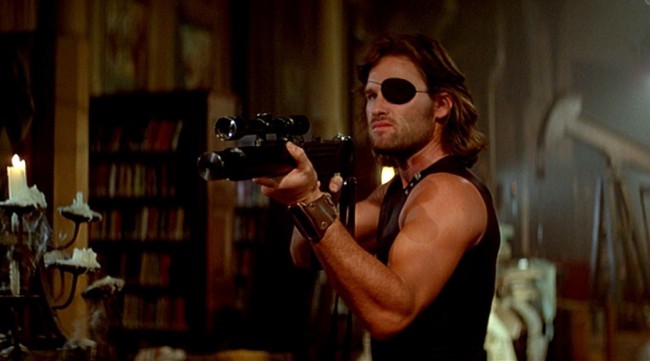It doesn’t matter what you think about Carpenter as a man, a writer, a director, a composer of his own scores. It doesn’t matter. You might love him, you might hate him, you might find his depiction of violence wrong and unethical. You can think whatever you want of him. But! what you can’t do is befoul the miracles he’s provided us—one miracle in particular.
And no, I’m not saying his movies are God’s gift to earthlings or that they’re masterpieces—although they are fun as fuck—what I am saying is that he’s able to achieve something most modern filmmakers have no clue how to do anymore: he knows how to make a lean 90-minute movie without skimping on the muscle.
Look at the trend nowadays: most popular blockbusters, mainstream fair, genre flicks—all realms of film which Carpenter is more than familiar with—think “the bigger, the better”, the more explanation, the more exposition and world building, the better. What they can’t seem to fathom is the power of suggestion, of bread crumbs, of saying “fuck you” to your first act and rolling the ball as quickly as possible.
Carpenter never lingered with his first acts. He sped through them as soon as humanly possible. Set up character, set up stakes, set up your hook, and then move onto explore the world and rules you’ve established, but only as your protagonist sees it. Never would Carpenter take the omnipotent route: sky rocket to the ether while looking down at the biggest of big pictures—holier-than-thou—covering every boring morsel. He localized it enough to retain the allure, the mysteries that first intrigued us. It takes Carpenter all of five/ten minutes to establish Escape from New York’s high concept pieces:
It’s 1997, New York’s a maximum security prison, the president’s been kidnapped, and Snake Plissken is the biggest bad ass you’re liable to meet.
What else is there to know?
Better question: do you even need to know any more?
Sure, POTUS is involved, too—a plot device personified and kidnapped by a pack of psychopaths relegated to America’s “futuristic” maximum-security lockdown. But that’s all he is: a catalyst to get Snake onto Manhattan for a taut and coiled hundred-minutes of mayhem and satirical wink-winking. Carpenter knows who he can flesh out and who can bounce around the pages of his script solely as a proponent for action and plot. He mixes and matches: for every caricaturized, plot-whored president, there’s a hard-edged woman challenging our notions of femininity’s role in cinema. Furthermore, when Carpenter doesopt for character development, he does it with an economical hand, with a deftness beyond most modern filmmakers’ capabilities.
Think about it, going back to Escape from New York: there’s a moment where Snake runs into an abandoned café or diner or some such hole-in-the-wall, and meets a “higher-classed” lady, most likely a moll to some local thug, and in those several minutes you get so much more from that one interaction than you would in a whole slew of Hunger Games flicks. You can see it, and you can believe it, the way this woman, trapped by nightfall in this decrepit hideout, ranges from pure sexual confidence to ragged fear. I felt that death. I only knew her for a handful of beats, but her death resonated more with me than any death the Hunger Games franchise has managed to muster up.
And again, Carpenter does it in a hundred minutes. Flat. He doesn’t need some quasi-trilogy set up—that eye-rolling trend where YA-trilogies just NEED a fourth film to extend an already bloated-as-fuck story. Carpenter’s overdrive, man, he’s road runner. He blasts through his films with the madness of a Formula One driver, and—most importantly—he knows how to smack his audience stupid with the crazies for MOREMOREMORE!
Seriously though: when was the last time you left the theater clamoring for more? When was the last time you felt as if a director wittingly deprived you of just enough to get you gung-ho for cinema—you know, instead of irritating you to the point of mantra: “Oh fuck man, he/she didn’t explain this, didn’t explain that.” When was the last time the director wowed you enough to ignore the details, the boring minutiae of a world that doesn’t really exist, the faux bureaucratic bullshit, the monetary system, the class system, etc.? Who even needs this information? Unless it adds to the plot, to the characters—unless it adds to my overall enjoyment, rather than my Google-bred addiction to any and all information, I don’t care about it.
C’mon now, plunge your memories, your most recent theater-going experiences: when was the last time you were satisfied with your movie just right? Not malnourished by it, not stuffed like a gluttonous piggly-wiggly? When was the last time you felt ravished by a movie, whisked away and whisked on back, your head all topsy-turvy and wondering why there wasn’t more? (Mind you: intellectually, you get it: the movie’s over, the plot’s closed off and cauterized, but the sensualist in you, the avarice little touch-monger, doesn’t. That little bugger craves more of the same.) When was the last time you felt so cinematically wracked by a crack-like addiction?
Hard pressed thinking of one, huh?
Well then…might be time for you to dust off your old LaserDisks, your old VHS tapes, and reintroduce yourself to The Master of Horror, Mr. John Carpenter.






